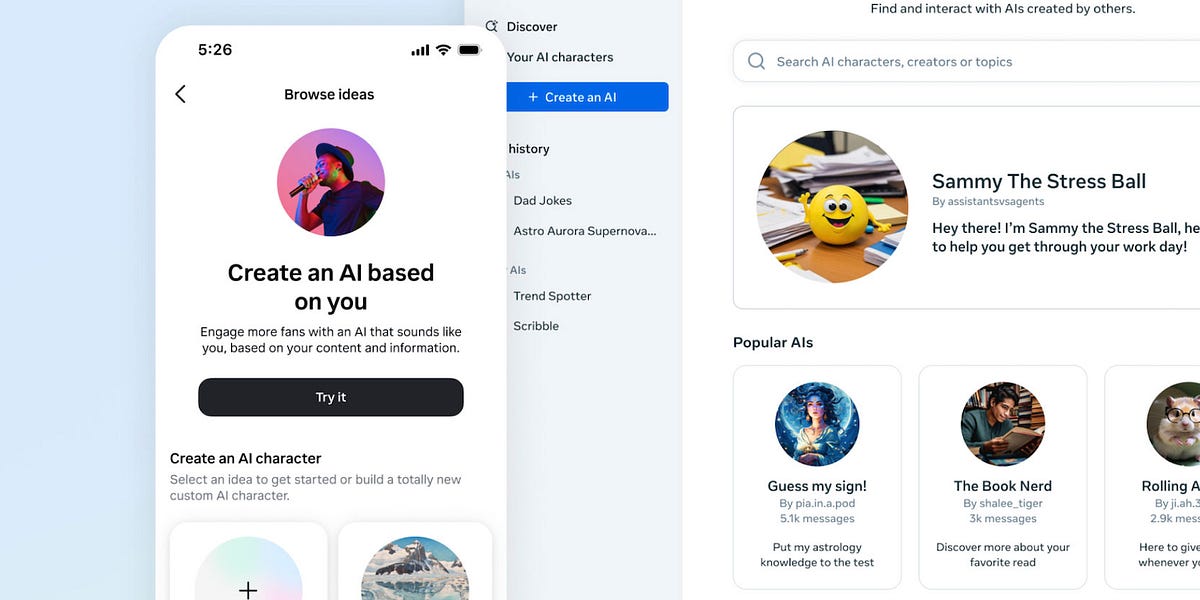Meta AI Enhances Strategy with Llama 3 405B and Customized Characters

Meta’s Bold Move into AI
Meta Platforms, the parent company of Facebook, Instagram, and WhatsApp, has made a significant commitment to artificial intelligence (AI). This strategic shift is motivated by two primary factors.
The Drivers of Meta’s AI Strategy
User Attention and Monetization:
- Meta’s business model is highly dependent on capturing user attention. This attention is then monetized through advertising and commerce. As AI assistants begin to claim more user focus, Meta aims to retain its dominance in this critical area.
- Competitive Landscape:
- Meta is not alone in its AI ambitions; major tech competitors are making substantial investments in AI development. To ensure it maintains market share, Meta is leveraging generative AI as a competitive edge by providing AI assistant features and foundational models for free to both consumers and developers.
Introduction of Meta AI
Meta’s entry into the AI space is marked by the launch of Meta AI in September 2023, utilizing the Llama 2 model. Initially, its performance lagged behind competitors like ChatGPT and Microsoft’s Copilot, as well as Google’s Gemini. However, with the recent introduction of the Llama 3 model, which boasts 405 billion parameters, Meta is leveling the playing field.
Key Features and Functionality
- Standard Model: The Llama 3 70B model is now the default offering, which fulfills the needs of many users globally.
- Advanced Model: A new option using the more powerful 405B model aims to enhance functionality and performance.
Mark Zuckerberg has expressed ambitious goals for Meta AI, indicating it’s on track to become the most used AI assistant by the end of the year. Some practical use cases include:
- Searching for information
- Role-playing difficult conversations
- Creative applications, like the “imagine yourself” feature that allows users to create images of themselves in various styles.
Adoption and Engagement
According to Meta’s recent earnings report, WhatsApp has been a significant platform for the adoption of Meta AI. Engaging features are being rolled out across more than 20 countries and in eight languages. An exciting addition is the Imagine Edit feature, enhancing user experience through image generation.
This rollout is crucial because Facebook and Instagram serve as the primary gateways for users into digital experiences. Users often start their activities on these platforms, and if they feel the need to utilize an AI assistant, it’s imperative that they find it within these apps, rather than going elsewhere.
Economic Model Focus
Meta’s business model hinges on user attention. Every decision regarding app features aims to increase user engagement. While WhatsApp has traditionally offered lower engagement metrics, Meta AI could pivot this trend by making the app more interactive and enjoyable.
Zuckerberg noted that, although increased engagement could lead to better monetization in the future, immediate returns may take years. The revenue model is clear — more time spent on the apps equates to more advertising dollars.
Meta AI Studio
Another significant offering is Meta AI Studio, set to empower creators by allowing them to craft customized AI characters that can interact with their audience. This could enhance creator engagement and permit users to connect in new ways. Zuckerberg explained:
- Users can build AIs tailored to their interests.
- Creators can create AI agents to communicate with fans and generate content.
This concept may draw parallels to existing features in platforms like ChatGPT but has broader aspirations. Notably, Meta’s efforts aim to include business applications, which could redefine how small businesses interact with customers and fans.
Market Response and Challenges
Despite the promising features, past attempts to engage users through AI chatbots have faced setbacks. For instance, efforts to use celebrity likenesses in AI chatbots did not attract substantial interest, highlighting the challenge of establishing a dedicated user base for new technology.
The competition in the AI sector remains fierce, with heavyweights like OpenAI and Microsoft focusing largely on productivity-enhancing applications, while Meta aims to carve out a niche in user entertainment and connectivity.
Final Thoughts
Meta’s unique approach to AI is shaped by a focus not on productivity, but on enhancing leisure and social engagement. By positioning itself as a provider of an enjoyable digital experience, Meta hopes to capture a significant share of the AI assistant market. As user retention becomes the cornerstone of Meta’s strategy, how successfully the company navigates this rapidly evolving landscape remains to be seen.






